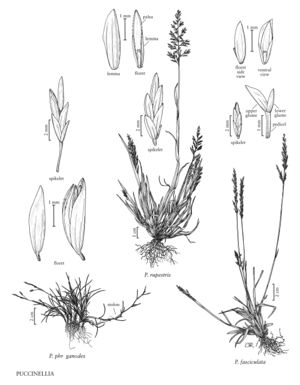Difference between revisions of "Puccinellia rupestris"
FNA>Volume Importer |
imported>Volume Importer |
||
| (8 intermediate revisions by 2 users not shown) | |||
| Line 17: | Line 17: | ||
-->{{Treatment/Body | -->{{Treatment/Body | ||
|distribution=N.Y.;N.J.;Pa.;Wash. | |distribution=N.Y.;N.J.;Pa.;Wash. | ||
| − | |discussion=<p>Puccinellia rupestris grows in coastal and noncoastal habitats in Eurasia; North American collections were apparently introduced in ballast.</p> | + | |discussion=<p><i>Puccinellia rupestris</i> grows in coastal and noncoastal habitats in Eurasia; North American collections were apparently introduced in ballast.</p> |
|tables= | |tables= | ||
|references= | |references= | ||
| Line 26: | Line 26: | ||
-->{{#Taxon: | -->{{#Taxon: | ||
name=Puccinellia rupestris | name=Puccinellia rupestris | ||
| − | |||
|authority=(With.) Fernald & Weath. | |authority=(With.) Fernald & Weath. | ||
|rank=species | |rank=species | ||
| Line 33: | Line 32: | ||
|basionyms= | |basionyms= | ||
|family=Poaceae | |family=Poaceae | ||
| + | |illustrator=Cindy Roché | ||
| + | |illustration copyright=Utah State University | ||
|distribution=N.Y.;N.J.;Pa.;Wash. | |distribution=N.Y.;N.J.;Pa.;Wash. | ||
|reference=None | |reference=None | ||
| Line 38: | Line 39: | ||
|publication year= | |publication year= | ||
|special status= | |special status= | ||
| − | |source xml=https:// | + | |source xml=https://bitbucket.org/aafc-mbb/fna-data-curation/src/200273ad09963decb8fc72550212de541d86569d/coarse_grained_fna_xml/V24/V24_663.xml |
|subfamily=Poaceae subfam. Pooideae | |subfamily=Poaceae subfam. Pooideae | ||
|tribe=Poaceae tribe Poeae | |tribe=Poaceae tribe Poeae | ||
Latest revision as of 16:24, 11 May 2021
Plants annual or biennial; tufted, not mat-forming. Culms 5-50 cm, erect to decumbent. Ligules 1-2 mm, obtuse to truncate, entire; blades 2-6 cm wide, flat or folded. Panicles 2-10 cm, contracted at maturity, lower branches ascending, spikelet-bearing nearly to the base; pedicels scabrous, sometimes only slightly so, sometimes with tumid epidermal cells. Spikelets 4-9 mm, with 2-6 florets. Glumes rounded to keeled over the back, midveins obscure or prominent, extending to the apices, often scabrous distally, lateral veins obscure, apices acute to obtuse; lower glumes 1-2 mm; upper glumes 2-3.2 mm; calluses with a few hairs; lemmas 2.5-4 mm, somewhat coriaceous for most of their length, glabrous or sparsely hairy on the lower 1/2, particularly along the veins, backs rounded to keeled, 5-veined, midveins and sometimes all veins prominent, midveins extending to the margin, often excurrent, apical margins hyaline, smooth to densely scabrous, apices acute to obtuse, entire; palea veins shortly ciliate proximally, shortly ciliate to scabrous distally; anthers 0.8-1.2 mm. 2n = 42.
Distribution
N.Y., N.J., Pa., Wash.
Discussion
Puccinellia rupestris grows in coastal and noncoastal habitats in Eurasia; North American collections were apparently introduced in ballast.
Selected References
None.
